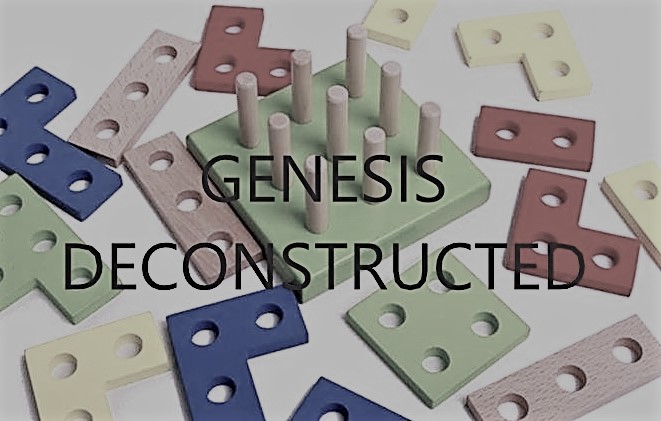Studying scripture in the original Hebrew and Greek sounds like an impossible task, but scripture clearly states if we are born of the spirit and keep God’s commandments the Holy Spirit will be our guide John 14:21 to 26, 16:13 & 1 John 2:27. Paul overcame Judaism through a revelation of Yahshua the Messiah, not from a man Gal 1: 11 – 13. We can and must do the same.
Ancient Hebrew did not have vowels and accents, so let’s begin our study of Genesis using the Hebrew Bible without Vowel Points and accents, available on Jesus Spoke Aramaic. Although the original text did not have spaces, it is very difficult to find the Hebrew text without spaces, and they should be more of a help than a hindrance until we gain more experience with the Hebrew alphabet, words, and sentences.
Hebrew Without Vowels or Accents
The text of Genesis 1: 1 – 5 appears as follows:
There are various free sources where we can view the Hebrew Bible in interlinear format – the Hebrew and English side by side. My favorite resource is Biblehub.com which has a Hebrew Text Analysis for each verse, with word-by-word English translation and major Hebrew source texts. On Biblehub, Hebrew words link to Strong’s Concordance and Exhaustive Concordance, NASB Exhaustive Concordance, Brown-Driver-Briggs Dictionary providing robust drill down capability for most words. Other resources include the parallel and interlinear text found on tanakh.info, and the word by word translation on shebanq.ancient-data.org. It is prudent to use multiple sources to verify both the Hebrew and its translation into English.
Samaritan Targum Interlinear Translation
Let’s take a look at the interlinear translation of Genesis 1:1 on tanakh.info, where the Hebrew text from the Samaritan Pentateuch and it’s English translation appear as follows:
Facts About Hebrew
Looking at this sentence we can learn some important facts about Hebrew that we can build upon:
- Hebrew reads from right to left, the opposite of English.
- The first ‘word’ בראשית is actually a phrase, commonly translated as “In the beginning”. Concordances include minor words like ‘the’, ‘and’ with nouns and verbs, and Dictionaries describe the meaning of nouns and verbs with and without these additional characters in their analysis.
- There are 22 letters in the Hebrew alphabet. You can create your own Hebrew Alphabet list and add information to help learn the Hebrew language as I have done, or you can use one of the many available for free on the internet.
- There are three common, single letter words in Genesis 1:1 that we can easily recognize which will help boost our understanding of Hebrew and our confidence. The first is beth ב that means ‘in’, which is the first word in the Hebrew Bible. The second is waw ו that means ‘and’ or ‘but’, and the third is he ה that means ‘the’, both are found in the phrase הארץ ואת “and the earth”.
- Et את is the most common word in the Hebrew Bible, occurring over 11,000 times, over 25 times in Genesis 1, and 2 times in Genesis 1:1. There is an et את between ‘God’ and ‘the heavens , and between ‘and’ and ‘the earth’ which according to Strong’s and NAS Exhaustive Concordances it is not translatable. Brown Driver Briggs states that et is “the mark of the accusative, prefixed as a rule only to nouns that are definite”. In this verse, et indicates that both “the heavens” and “the earth” are direct objects of the verb “create”.
- In ancient Hebrew, verbs did not represent whether they were past, present or future tense, but it is assumed based on the context of the sentence. In Gen 1:1, because the sentence is describing an event that took place in the past, the verb ‘create’ is translated in the past tense, as ‘created’.
- Most Bibles are not literal, word for word, translations. Words have been added, removed and mistranslated to support theological views. In the first word בראשית there is no he ה, yet every English translation adds ‘the’ to the phrase “In beginning”. Both ‘God’ אלהים and ‘the heavens’ השמים are plural, as indicated by the suffix ים, yet ‘God’ is not translated as plural in any Bible version. This manipulation of the text can and often does insert translator bias which may impact our understanding of God’s message. I propose to accept what the Hebrew text is saying, word for word, and deal with the theological implications later.
Analysis
Genesis 1:1 contains four nouns – beginning, gods, heavens, and earth, and one verb – create. It would be prudent to research words as we come across them in our study and create a Dictionary of words we have vetted, that we can build on moving forward. When we’re comfortable that the translation of the words is accurate, we can construct the sentence.
Hebrew sentences are constructed just like English – subject – verb – object. The subject of this sentence is what ‘gods’ did ‘first’, the verb describes the action that took place, in this case ‘create’, and the object of creation are ‘the heavens and the earth’.
In my next article, I will look at Genesis 1:2 to 5.
Discover more from Genesis Deconstructed
Subscribe to get the latest posts sent to your email.
